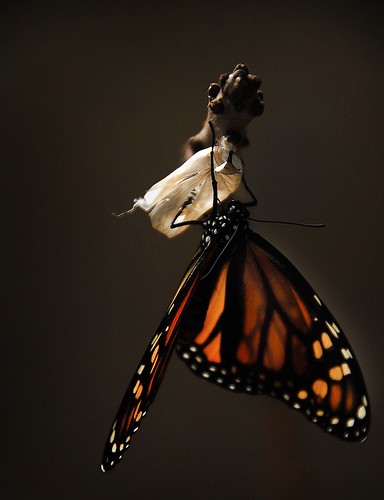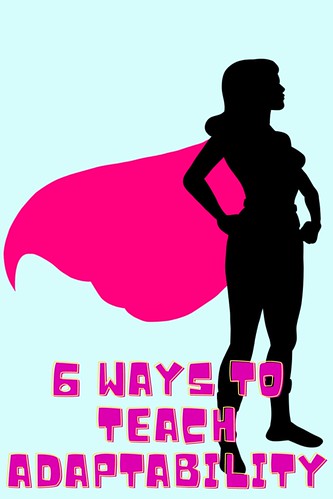Through the Eyes of an Educator: Adaptability is a Superpower
“The best entrepreneurs and most successful people I’ve ever encountered view change as opportunities. Every time an industry is adjusted and the terrain shifts, they don’t get on a soapbox and start complaining. Instead, they analyze the situation and determine how they can adapt, and act, in a way that leaves them better than they would have been if they kept trying to do the same thing.”
- Steli Efti (Forbes)
Everything is constantly changing. Today, it’s more than the days of the week, seasons, and thoughts. It’s more than a company’s logo design, how we get our food, and exchange information. Today, amidst a global pandemic of epic proportion, the rules, protocols, and statistics are constantly shifting; it’s often too much to keep track of it all. And, as always, we have options. We can get angry about it, stamp our feet, and shout at the top of our lungs that we hate change and want everything to stay the way it was. We can complain to anyone who will listen about how everything sucks right now and we want our lives back. Or, we can sit up straight, watch as the shifts occur, channel a flexible mindset, and learn to adapt.

I can remember days teaching in that traditional classroom when the power went out and the entire class would look around thinking that well, if the electricity doesn’t work, the computers don’t go on, and the lessons can’t show up on the smart board–well, school’s over now. Needless to say, teachers pivoted, just as they did in this time of distance learning. Chalkboards don’t need power, books don’t need plugs, paper and pens still work, and the facilitation of discussion is energized by those in the room, not an outlet.
You can stay stuck and fight the situation, or you can look at what’s in front of you, and find a way to act accordingly, with a positive and open mindset, and a determination to succeed.

And, ‘if at first you don’t succeed’, channel that persistence, take the risk, and try another path. Remember, the power outage won’t last forever–and at least while it does, your ability to adjust, modify, and succeed in the face of adversity sends a powerful message to those who are watching.
Change is constant–and complaining about it doesn’t stop the change. It doesn’t halt it, it doesn’t control it. In fact, it has absolutely no impact on it at all. However, it does impact the complainer. Those negative words and that negative attitude often hold far more weight than the actual change itself. Adaptability empowers. Adaptability flips the script, changes the mindset, and showcases a desire to figure it out, make it work, and even thrive amidst the adversity.
Adaptability is a superpower. How will you strengthen yours?

Adaptability can be learned. Adaptability can be taught. Adaptability can change the perspective, challenge the thinker, and make a situation that once seemed insurmountable far more than palatable, even one in which the once complainer can now believe is possible. At a young age, children learn far more than we know: multiple languages by the age of three, and more than we can even imagine of our mannerisms, our attitudes, and our opinions about life. Things like scraping their knee and looking up wondering whether they’re really all right or not, feeling as if a vacation is ruined if it rains a few days, or hearing a difficult bit of news and literally thinking the world is going to end...between a mixture of perspective, choice, and adaptability, these outlooks can have very different meanings, impact, and results.
Presently, the entire world is living through a global pandemic. The way we’ve gone about doing pretty much everything in our lives, right now, is different. Going to the supermarket might not be an option, hitting the gym is out for most of us, and physically sharing space with friends and family is a completely different story. Today, heaps of us are pivoting perspectives, careers, and choices. None of it is instantaneous. It takes time to digest, think, rethink, adjust, adapt, and change.
Being open to that change makes all the difference.
For many of us, we’re now entering month 5 of the Covid-19 pandemic. Those beginning weeks and months seem far in the distance now. We’ve learned, scientists have learned, medical professionals have learned–and we’ve all been forced to deal with twists and turns along the way. Those who have managed to adapt, or continue to adapt, are far better off than those who have not. Perhaps you’ve figured out how to get your supermarket shopping without entering a store. Perhaps you’ve figured out how to get a workout outside at a safe distance, or ordered one of the many available options to get your sweat on at home. Perhaps you’ve gotten the hang of Facetime, have sent cards to family, or have even managed to share a smile with friends through a glass door.
You’re adapting; you’re shifting your focus from fighting the situation to going with the flow. The anger dissipates, the ‘I wish it was like this’ story fades, the perspective shifts, and the ability to not only survive, but flourish takes flight. This is what the younger generation needs to see. The adaptability characteristic isn’t often written on a rubric. It’s not often shown through formulas nor is it found in the bubbles on a multiple-choice exam. However, it is an often-tested skill. We see it daily in team sports. We see it daily in every aspect of school and life. Kids face adversity, obstacles, challenges, difficulties, and struggles of all sorts and on all levels. That ability to adapt, pivot, shift focus, or know how to get up, dust yourself off and give it your best shot is essential.

As adults, we see those adaptive skills everywhere. People tend to try to find ways to manage physical challenges. If it rains on your holiday, there is always the option to jump in the puddles and hunt for rainbows. When one business idea doesn’t work as well as projected, we can shift the focus, and pivot for a purpose. If you can’t get to your most favourite restaurant, make that favourite dish and savor the flavours. When it’s not safe to travel amidst a global pandemic, activate that imagination and find a way to bring that holiday to your home. We’ve heard the phrase ‘when life gives you lemons’ a million times–adaptability is all in how you choose to end the sentence.
What words will you choose?
Teaching adaptability to the next generation

Ditch that fear of failure
Mia Hamm didn’t become a soccer phenom overnight, Bill Gates tried many versions of Microsoft before it became the one you have today, and Harry Potter wasn’t published by the first, second, or third company the author approached. Little kids aren’t born with that fear of failure. The Imposter Syndrome of epic doubt doesn’t show up at birth. In many yoga classes, the instructor often shares, ‘it’s yoga practice, not yoga perfect’ - it’s more than okay to fall out of a pose; the learning is in the doing. Showing up matters. Trying something matters. Following your dreams matters. Getting up off the mat and trying again is what it’s all about; there’s learning in every step. Try–definitely try.
“I’ve missed more than 9000 shots in my career. I’ve lost almost 300 games. 26 times, I’ve been trusted to take the game winning shot and missed. I’ve failed over and over and over again in my life. And that is why I succeed.” - Michael Jordan
Learn to maneuver through the uncomfortable
A therapist might tell you to ‘sit with it’. A yoga practitioner might tell you to ‘send your breath into the tight spots’. A teacher might tell you that ‘you can do hard things’. Many things in life are uncomfortable. Sometimes we’re dealing with difficult social issues, sometimes family drama happens, sometimes a situation causes struggle, and sometimes life just isn’t fair. Disney’s Anna (of Frozen fame) reminds us all that even in the face of grave situations, we can take a deep breath, put one foot in front of the other, and ‘do the next right thing’. Each step leads us to another. Each mountain you climb makes the next more manageable. It might be uncomfortable. It most likely will be–you can still do it. We believe in you.
“It’s good to do uncomfortable things. It’s weight training for life.” - Anne Lamott
Encourage an open-minded attitude
Think of a toddler trying to learn a new skill. The phrase ‘I do myself’ is uttered often. Rarely do they see obstacles in their way of success, and if they do come across obstacles, they find ways around them. Approach life the same way. Choose the ‘of course you can’ mindset instead of ‘here are the reasons why you can’t’. Listen. Engage and let them give it their best shot...and if that first time doesn’t work, nor the second, perhaps they’ll learn lessons along the way and find a new way the next time around.
“Keep an open mind and a compassionate heart.” - Phil Jackson
Take the risk
Of course, there are best practices in life that we learn at a young age. We learn not to put our hands on a hot stove, to look both ways before crossing the street, and to not stand too close to the edge of an active volcano. No one is suggesting to take risks that would directly affect your health or ever cause harm to yourself or any other being. But those other risks? Take them. That honors course, you know might force you to work really hard, you’re nervous, but still want the chance–take it. That business you’ve been dreaming of starting since you were seven–give it a shot. That goal you’ve had for yourself to accomplish–go get it. And if it doesn’t work out the way you planned, okay. There are lessons in everything we do. Find the lesson, learn from the experience, share your story; then take the next step in the process and go for it.
“You are braver than you believe, stronger than you seem, and smarter than you think.” - A.A. Milne (Winnie the Pooh)
Shift your thought process
How do you see the world? Do you take the viewpoint of glass half empty, glass half full, looking for the glass, wondering what’s in the glass, want to share the glass with a friend, or some other view of the world? Think of how you approach adversity, difficulty, or struggle. When something goes awry or not according to plan, do negative words flood your brain? Do you notice yourself using ‘can’t, won’t, don’t’ terminology? Do you find yourself speaking to yourself with those damaging words? Flip the script. Shift the narrative. Try as you can to sit with whatever challenges arise. Work to speak more positively to yourself and those around you. Challenge your mind to find the positive, the gratitude, and that perspective.
“Life isn’t about waiting for the storm to pass...it’s learning to dance in the rain.” - Vivian Greene
Learn things
Think of the most curmudgeonly character you’ve ever witnessed on television. The one set in their ways, the one with the ‘this is how it’s always been done, why would we change it’ attitude, the one who refuses to learn anything new, and the one who dismisses anything that doesn’t fit their narrative–that one.
Now, do the opposite.
Learn things. Read voraciously, devour teachings, listen actively, engage in discourse with those different from you, and keep those eyes and ears wide open. Perspective is a game changer. Look closely at the world around you to grow your awareness levels. Learn, grow, adapt–you CAN do hard things.
Channel Maya Angelou’s wise words: ‘”Do the best you can until you know better. Then when you know better, do better.”

Stacey Ebert, our Educational Travels Editor, is a traveler at heart who met her Australian-born husband while on a trip in New Zealand. Stacey was an extracurricular advisor and taught history in a Long Island public high school for over fifteen years, enjoying both the formal and informal educational practices. After a one year 'round the world honeymoon, travel and its many gifts changed her perspective. She has since left the educational world to focus on writing and travel. She is energetic and enthusiastic about long term travel, finding what makes you happy and making the leap. In her spare time she is an event planner, yogi, dark chocolate lover, and spends as much time as possible with her toes in the sand.
Check out her website at thegiftoftravel.wordpress.com for more of her travel musings.


















